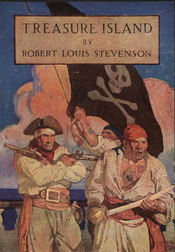Written in the nineteenth century, Treasure Island was the beginning of Robert
Louis Stevenson's career as a writer. While numerous critics think that his work
(Treasure Island) was a great success, there are still some that think it was not. In there
critiques they deal with moral concerns that the people of Stevenson's tome may have had
and literary excellence.
Maurice Hewlett says in his article in "Criticism Today" that Treasure Island along
with many other works of Stevenson is "not so wonderful a performance after all"
(www.wwwesterni.unibg.it/siti_esterni/rls/critrec.htm, 3/01/03). H.L.Mencken says that
even Stevenson's most doting admirers find his literature difficult to read. However, in
the struggle to read it, Treasure Island and other works by Stevenson belong in the second
rank if not first. Mencken also adds that here is nothing in Treasure Island to save it and
that it was empty. "But their ideas are seldom notable either for vigor or originality"
(www.wwwesterni.unibg.it/siti_esterni/rls/critrec.htm, 3/01/03).
Stevenson himself admits in a letter to Sidney Colvin that he borrowed ideas for
his own pieces of work from others. Still after admitting that he gains a number of fans
including William Gladstone (1809-1898), who served as the British Prime Minister for
four terms between 1865 and 1894, as one of his greatest fans. Apparently it is written
well enough to gain fans throughout England. So it must be a somewhat good piece of
literature. William Blackburn writes in his essay, "Much of Treasure Island is in brilliantly
handled dramatic dialogue, salty enough to convey the tang of piratical talk yet chaste
enough to pass muster with the most respectable of parents" (Nineteenth-Century
Literature Criticism, Vol. 63, pp.253). It is so wonderfully written that it is suitable for all
ages. For example, to clarify something, before misunderstanding, he uses brief
interjections from the narrator or a more mature character. This is especially helpful to the
young reader.
Blackburn writes that Treasure Island is "brilliantly handled" with its
"interweaving" activities that would happen at the same time. A young person is able to
understand what happens all the time. Yet, in writing for the young reader, Stevenson
also writes so that adults are able to enjoy it as well as the young reader.
"Stevenson is very much aware of the need to supplement children's experience of
human nature," says Blackburn. He shows morals for everyday life. Blackburn writes that
Stevenson found numerous ways to portray values leading to success in this world. Jim
Hawkins, as the narrator and the protagonist of the story, knows that the treasure he
wants was blood money, and he is afraid of becoming somebody who can live with himself
possessing all that money while knowing what the cause of it was. It would be immoral.
The book describes the island as a place with swamps and the whole place seems kind of
gloomy. Blackburn believes that this description may in fact be a reflection of Jim
Hawkins himself -- an internalization. The adventure in Treasure Island is, beneath it all,
"a psychological journey" with "its most precious reward being a modest degree of
self-knowledge" (Nineteenth-Century Literature Criticism, Vol. 63, pp.252).
Jim "regrets having broken the rules, even when following them might have led to
disaster" (Nineteenth-Century Literature Criticism, Vol. 63, pp.256). Blackburn thinks
that the book shows that it is better to follow the rules that lead to disaster than to break
the rules all together. He definitely believes that Treasure Island has things to give the
reader moral understandings.
David H. Jackson writes in an essay, "Because the romance revival was a
conservative literary response to the ideological crisis of late-Victorian England, the
reception of Treasure Island must be understood in relation to the horizon of literary and
moral expectations shared by Haggard, Stevenson, and their many middle-classed readers.
The romance movement distrusted scientism and deliberately idealized life"
(Nineteenth-Century Literature Criticism, Vol. 63, pp.257). While there are those who
think that Treasure Island is not so great, there are some that think that it is a great novel
because it deals with moral issues and is written for not only the child but the adult too.
An essay in the "Pall Mall Gazette" says Treasure Island is: "A book for boys which can
keep hardened and elderly reviewers in a state of pleasing excitement and attention"
(Nineteenth-Century Literature Criticism, Vol. 5, pp.394). None of the critics today can
tell you if Treasure Island is a good book or not. It is a matter of perception to see it as a
good or bad book. Like the saying is, "You can't argue taste."
Works Cited
Barterian, Gerald R., Evans, Denis Nineteenth-Century Literature Criticism Vol. 63.
Detroit: Gale Research Company, 1984. This source has a brief ananysis of
Treasure Island's literary excellence.
Harris, Laurie Lanzen, Fitzgerald, Sheila. Nineteenth-Century Literature Criticism Vol.
5. Detroit: Gale Research Company, 1998. This source has numerous critics
talking about literary excellence and morals that is shown through Treasure Island.
ClassicNote on Treasure Island: About Treasure Island, 1 March 2003
Robert Louis Stevenson: Critical Reception, 1 March 2003


